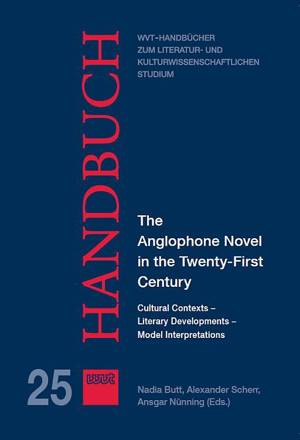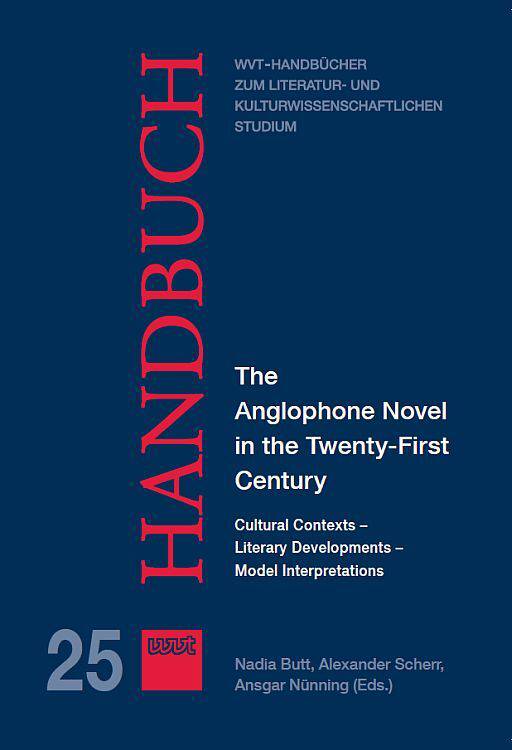
- Retrait gratuit dans votre magasin Club
- 7.000.000 titres dans notre catalogue
- Payer en toute sécurité
- Toujours un magasin près de chez vous
- Retrait gratuit dans votre magasin Club
- 7.000.0000 titres dans notre catalogue
- Payer en toute sécurité
- Toujours un magasin près de chez vous
The Anglophone Novel in the Twenty-First Century
Cultural Contexts - Literary Developments - Model Interpretations
34,95 €
+ 69 points
Description
In an age pervaded by global crises and planetary concerns, the Anglophone novel is undergoing significant transformations - as are the theoretical vantage points from which literary scholars study literature. This handbook aims to establish a decidedly transnational and global perspective on the contemporary novel in English. In addition to offering frameworks for theorising Anglophone literature (postcolonial studies, world literary studies, new sociological approaches, and more), it surveys (trans)cultural contexts of Anglophone fiction, literary responses to global concerns, and new novelistic forms as well as transformations of established genres.
Addressing students, professors, and literary scholars alike, the volume explores the following key questions: What are the dominant themes and topics of 21st-century Anglophone novels? Which cultural dynamics have impacted the development of Anglophone fiction, roughly over the past two decades? How can we link these developments to the genre of the novel with its European legacies? What authors - from all parts of the globe - have shaped the Anglophone literary field? Which works are among the most significant novels of the new millennium so far, and how have they altered and propelled our very notion of 'the Anglophone novel'? What new forms of the novel have emerged in recent years, and how have established genres been transformed to negotiate transnational concerns? How can we read contemporary novels as articulations of both local and global narratives? Providing multifaceted answers to these and several other questions, the chapters in this handbook offer different models for investigating the contemporary Anglophone novel on a transnational plane.
TABLE OF CONTENTS
I. THE CONTEMPORARY ANGLOPHONE NOVEL IN THEORY
1. ALEXANDER SCHERR, NADIA BUTT & ANSGAR NÜNNING
Fictions of Transculturality in an Age of Global Connectivity: The Anglophone Novel in the Twenty-First Century11
2. ALEXANDER SCHERR
The World of the Contemporary Anglophone Novel: Sociological Approaches to Twenty-First-Century Literature31
II. TRANSCULTURAL IDENTITIES, GLOBAL FORMS OF TRAVEL, AND NEW ENCOUNTERS
3. HANNA TEICHLER
Transcultural Memory and Transoceanic Entanglements in Abdulrazak Gurnah's Paradise (1994) and Amitav Ghosh's The Ibis Trilogy (2008-2015)55
4. STEFANIE KEMMERER & PAVAN KUMAR MALREDDY
Contemporary Arab Novels in English: Political Resistance in the City Spaces of Arab Spring Novels by Saleem Haddad and Omar Robert Hamilton69
5. CAROLIN GEBAUER
Reframing Migration in a Globalised World: Representations of Mobility in Dina Nayeri's Refuge (2017) and Xiaolu Guo's A Lover's Discourse (2020)83
6. MAGDALENA PFALZGRAF
World Literary Citizenship in Anglophone African Novels: Self-Perception and Afropolitan Globality in Sefi Atta's A Bit of Difference (2012) and Valerie Tagwira's Trapped (2020)101
7. MARION GYMNICH
Speaking English in the Global World: Multilingualism and Translation in Nnedi Okorafor's Akata Witch (2011) and Alexis Wright's The Swan Book (2013)119
III. GLOBAL CONCERNS IN THE TWENTY-FIRST-CENTURY ANGLOPHONE NOVEL
8. KYLIE CRANE
Flows and Eddies of the Anthropocene in Anglophone Novels: Helon Habila's Oil on Water (2010) and Monique Roffey's Archipelago (2012)137
9. MELISSA KENNEDY
Critiquing Capitalism: The Neoliberal Self-Help Entrepreneur in Aravind Adiga's The White Tiger (2008) and Rahul Kanakia's Enter Title Here (2016)153
10. GIGI ADAIR
Queer Diasporic Bodies, Caribbean Urbanity, an
Addressing students, professors, and literary scholars alike, the volume explores the following key questions: What are the dominant themes and topics of 21st-century Anglophone novels? Which cultural dynamics have impacted the development of Anglophone fiction, roughly over the past two decades? How can we link these developments to the genre of the novel with its European legacies? What authors - from all parts of the globe - have shaped the Anglophone literary field? Which works are among the most significant novels of the new millennium so far, and how have they altered and propelled our very notion of 'the Anglophone novel'? What new forms of the novel have emerged in recent years, and how have established genres been transformed to negotiate transnational concerns? How can we read contemporary novels as articulations of both local and global narratives? Providing multifaceted answers to these and several other questions, the chapters in this handbook offer different models for investigating the contemporary Anglophone novel on a transnational plane.
TABLE OF CONTENTS
I. THE CONTEMPORARY ANGLOPHONE NOVEL IN THEORY
1. ALEXANDER SCHERR, NADIA BUTT & ANSGAR NÜNNING
Fictions of Transculturality in an Age of Global Connectivity: The Anglophone Novel in the Twenty-First Century11
2. ALEXANDER SCHERR
The World of the Contemporary Anglophone Novel: Sociological Approaches to Twenty-First-Century Literature31
II. TRANSCULTURAL IDENTITIES, GLOBAL FORMS OF TRAVEL, AND NEW ENCOUNTERS
3. HANNA TEICHLER
Transcultural Memory and Transoceanic Entanglements in Abdulrazak Gurnah's Paradise (1994) and Amitav Ghosh's The Ibis Trilogy (2008-2015)55
4. STEFANIE KEMMERER & PAVAN KUMAR MALREDDY
Contemporary Arab Novels in English: Political Resistance in the City Spaces of Arab Spring Novels by Saleem Haddad and Omar Robert Hamilton69
5. CAROLIN GEBAUER
Reframing Migration in a Globalised World: Representations of Mobility in Dina Nayeri's Refuge (2017) and Xiaolu Guo's A Lover's Discourse (2020)83
6. MAGDALENA PFALZGRAF
World Literary Citizenship in Anglophone African Novels: Self-Perception and Afropolitan Globality in Sefi Atta's A Bit of Difference (2012) and Valerie Tagwira's Trapped (2020)101
7. MARION GYMNICH
Speaking English in the Global World: Multilingualism and Translation in Nnedi Okorafor's Akata Witch (2011) and Alexis Wright's The Swan Book (2013)119
III. GLOBAL CONCERNS IN THE TWENTY-FIRST-CENTURY ANGLOPHONE NOVEL
8. KYLIE CRANE
Flows and Eddies of the Anthropocene in Anglophone Novels: Helon Habila's Oil on Water (2010) and Monique Roffey's Archipelago (2012)137
9. MELISSA KENNEDY
Critiquing Capitalism: The Neoliberal Self-Help Entrepreneur in Aravind Adiga's The White Tiger (2008) and Rahul Kanakia's Enter Title Here (2016)153
10. GIGI ADAIR
Queer Diasporic Bodies, Caribbean Urbanity, an
Spécifications
Parties prenantes
- Editeur:
Contenu
- Nombre de pages :
- 300
- Langue:
- Anglais
- Collection :
- Tome:
- n° 25
Caractéristiques
- EAN:
- 9783989400023
- Format:
- Livre broché
- Dimensions :
- 206 mm x 17 mm
- Poids :
- 539 g

Les avis
Nous publions uniquement les avis qui respectent les conditions requises. Consultez nos conditions pour les avis.





